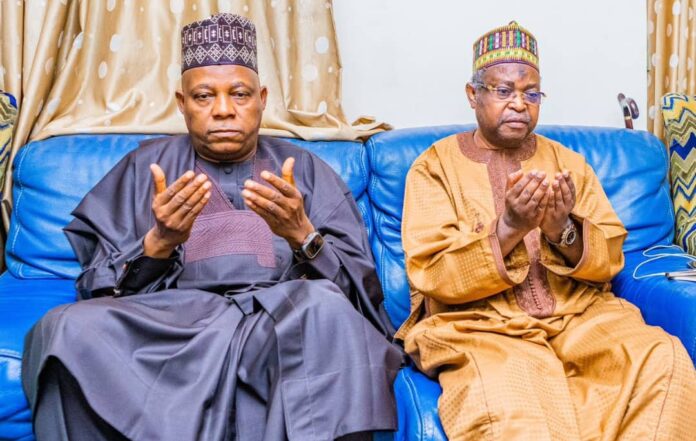By Dr. James Bwala
Kashim Shettima, the vice president of Nigeria, embodies the qualities of a hero navigating the complexities of governance in a nation fraught with challenges. Taking leadership by its steps, Shettina is particularly significant given Nigeria’s multifaceted socio-political landscape, marked by ethnic divisions and economic disparities. Despite unverified claims suggesting that his role is merely to appease regional factions, Shettima has demonstrated a commitment to national unity and stability that transcends mere political maneuvering.
Kashim Shettima’s proactive approach to economic development and security issues positions him as a pivotal figure in addressing Nigeria’s pressing challenges. His initiatives aimed at fostering inclusivity and promoting dialogue among diverse groups reflect his understanding of governance as a collective endeavor rather than an isolated function. By prioritizing collaboration over division, he exemplifies heroic leadership in tumultuous times.
Kashim Shettima’s private and political outings should be viewed through the lens of resilience and dedication to public service. His unwavering resolve amidst adversity qualifies him as a hero on a thousand mountains, embodying hope for a more unified Nigeria. While some critics may argue that his efforts are merely symbolic or politically motivated, it is undeniable that Shettima’s actions have sparked vital conversations about the future of Nigeria’s governance and development. His strategic vision for Nigeria’s future underscores his role as a leader who not only addresses immediate concerns but also lays the groundwork for long-term prosperity and cohesion.
Shettima’s ability to navigate complex political terrains while maintaining a focus on inclusive progress demonstrates a level of statesmanship that is both rare and essential in today’s Nigeria. His efforts to strengthen Nigeria’s democratic institutions and promote transparency further highlight his commitment to fostering a stable and prosperous nation. His ability to inspire trust and cooperation among various political and social factions further cements his status as a transformative leader in Nigeria’s evolving landscape.
As Nigeria continues to navigate its complex socio-political landscape, Shettima’s leadership serves as a beacon of hope and a testament to the power of visionary governance. His commitment to bridging divides and fostering dialogue among Nigeria’s diverse communities illustrates a leadership style that prioritizes unity over division. By prioritizing dialogue and collaboration, Shettima exemplifies the type of leadership that is crucial for addressing Nigeria’s challenges in a manner that unites rather than divides its people.
Unwavering dedication to national unity and development, Kashmiris exemplified by his initiatives aimed at empowering marginalized communities and fostering economic growth across all regions of Nigeria. His visionary approach has not only led to significant policy reforms but also encouraged a culture of accountability and inclusivity within the government. His efforts in promoting educational initiatives and improving infrastructure have paved the way for a more prosperous future, demonstrating his commitment to uplifting all sectors of society.
Kashim Shettima’s leadership style, characterized by empathy and strategic foresight, has garnered respect both domestically and internationally, solidifying his reputation as a transformative figure in Nigerian politics. His dedication to fostering unity among diverse communities has further underscored his role as a bridge-builder in a nation marked by its rich cultural tapestry. Through his proactive initiatives, such as promoting inclusive economic policies and prioritizing education, Shettima has demonstrated an unwavering commitment to the sustainable development of Nigeria’s future.
Through his visionary leadership and collaborative approach, Shettima has become a symbol of resilience and progress amidst the challenges facing the nation. His influence extends beyond political boundaries, inspiring a new generation of leaders to embrace principles of transparency and innovation in governance. His ability to navigate complex political landscapes and address pressing national issues with pragmatism and integrity continues to inspire confidence in his leadership. His steadfast commitment to fostering economic diversification and reducing dependency on oil revenues has positioned him as a key architect in reshaping Nigeria’s economic landscape. His strategic initiatives in enhancing agricultural productivity and supporting local industries have not only stimulated economic growth but also empowered communities, fostering self-reliance and innovation across the nation.
Kashim Shettima’s emphasis on technological innovation as a catalyst for economic transformation has further cemented his status as a forward-thinking leader. His efforts in promoting peace and stability have also been crucial in addressing regional conflicts and fostering a climate of trust and cooperation among states. His dedication to fostering educational opportunities for all, particularly in underserved regions, underscores his belief in education as the cornerstone of national development.
His commitment to inclusive governance and social justice has further demonstrated his dedication to creating a more equitable society for all Nigerians. His unwavering dedication to national unity and his efforts in bridging ethnic and religious divides have further solidified his legacy as a unifying force within the country. His proactive approach in engaging with international partners has further enhanced Nigeria’s diplomatic standing. His visionary leadership and tireless advocacy for sustainable development have garnered him respect both domestically and internationally, further elevating Nigeria’s profile on the global stage.
The vice president has demonstrated leadership in addressing climate change challenges and promoting sustainable energy solutions; this has also demonstrated his commitment to a greener future for Nigeria, aligning the nation with global environmental goals. His strategic initiatives in infrastructure development have not only improved connectivity within Nigeria but have also facilitated regional trade, enhancing economic ties with neighboring countries. His efforts have not only focused on domestic achievements but also on strengthening Nigeria’s role as a pivotal player in regional and international peacekeeping missions. His ability to navigate complex geopolitical landscapes with tact and diplomacy has further cemented his status as a hero on the international stage. His transformative policies in healthcare have increased access to medical services, significantly improving the quality of life for countless Nigerians.
* James Bwala, PhD, writes from Abuja.
End




